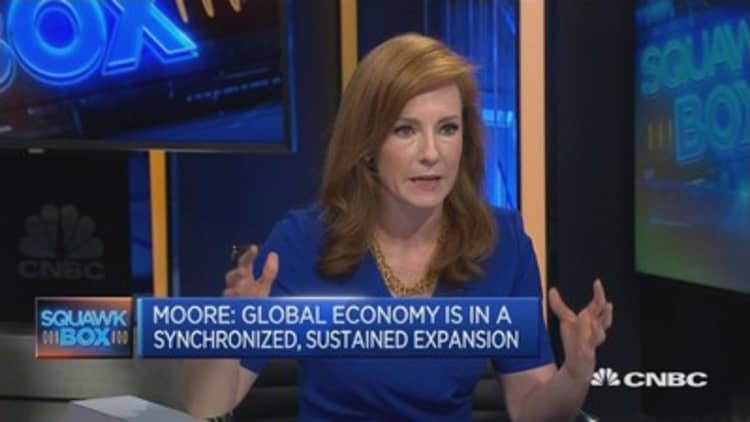
Market fundamentals look fairly strong, but political fears have held investor spirits in check, Kate Moore, chief equity strategist at BlackRock Investment Institute, told CNBC on Tuesday.
"There's been a tremendous amount of anxiety about taking equity risk so far this year," she told CNBC's "Squawk Box," adding that the fear came despite "pretty good" earnings.
"I wouldn't call them amazing, but they're looking pretty good in the U.S., amazing actually in some places outside the U.S. and overall economic conditions being pretty strong, we haven't seen a willingness to take risk," she said.
"It's really hard to quantify how much of that is because of political fear or all this negative media attention around our relationships with other countries, but I do think it has an impact on U.S. investor psyche," Moore said.
President Donald Trump's administration has faced weekly headlines about allegations his campaign colluded with Russia to influence the U.S. election last year.
The White House has denied collusion, but Trump's son admitted earlier this month that he and other campaign officials had met with a lawyer with ties to the Russian government in hopes of gaining compromising material on opposing candidate Hillary Clinton.
But despite the political noise, Moore remained upbeat on the outlook for equities.
"We are in a sustained economic expansion, the fundamentals look pretty darn good and we aren't necessarily at the end of the cycle," she said.
Moore added that markets were stripping out expectations that the Trump administration would deliver on policy this year.
"Business owners and investors have decided to just stop paying attention to D.C.," she said. "At the beginning of this year, we were pretty hopeful that we were going to get a big tax policy reform or some change in health care, or some news on infrastructure and I think, not just us, but most analysts on the Street have reduced that expectation for 2017 to close to zero and have really removed it from their estimates."
Her comments came as two more Republican senators said on Monday they will oppose the current Republican health-care bill, bringing the total to four. The GOP holds 52 seats in the Senate, and the defections meant there weren't enough votes for a motion to proceed — a procedural vote that would start debate on the bill.
Republicans were tackling the health-care overhaul before tax reform, another key campaign plank, as many of the cuts in health-care spending were earmarked to finance the proposed tax changes.
Analysts have viewed every setback to the health-care bill as delaying the party's broader agenda.
But Moore said she expected the equity markets would continue to perform.
"What I think we're seeing in terms of analyst estimates now are pretty clean. They are outside of politics, they are outside of policy and they're really about fundamentals," she said.
Wall Street has been closely watching quarterly earnings amid the stock market's latest record run.
The and the S&P 500 notched all-time highs last week. The , meanwhile, entered Monday's session just half a percent away from its record high.
On Monday, BlackRock, the world's largest asset manager, reported second-quarter adjusted earnings per share of $5.24 on revenue of $2.965 billion, up from $4.78 per share on sales of $2.804 billion in the year-earlier period.
The firm's second-quarter assets under management rose 16 percent on-year to $5.689 trillion, topping analyst expectations.
—CNBC's Fred Imbert and Jacob Pramuk contributed to this article.


